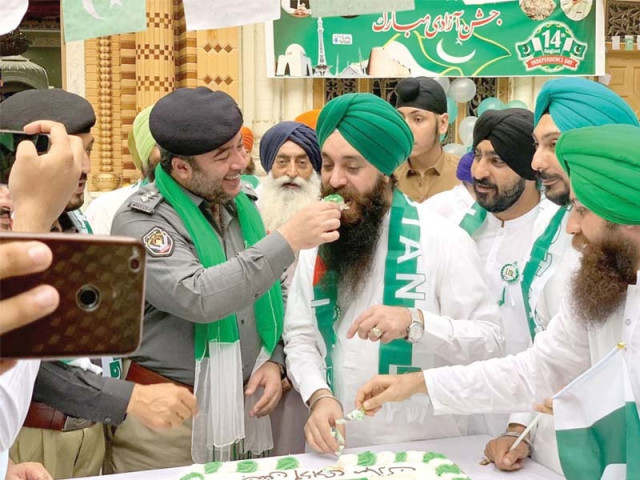Celebrating a nation of many faiths
Members of Christian, Hindu and Sikh communities congratulate Pakistan on its 73rd year of Independence

When the British made their exit in the summer of 1947, leaving behind a divided subcontinent, it was not just the Hindus and Muslims who had to pay the price of partition. Caught somewhere between the crossfires of two raging giants and a retreating crown, were also the various religious minorities on whom befell the exigencies of choosing a side. Where some stayed in India, others chose to join the newly formed Pakistan. Either way, they knew the decisions they made that day would come to define their own identity and also of their generations to come. Thus, on account of the country’s Independence Day, the communities which opted join Pakistan, remember their forefather’s struggle towards the cause of a pluralistic nation and pray for a prosperous future.
Remembering the past
According to Archbishop of Lahore Sebastian Francis Shaw, the role and services of the subcontinent’s non-Muslim are pivotal to the establishment of Pakistan. He said that the minorities living in India, especially the Christians had always been supportive of Jinnah’s vision of an inclusive and impartial government, religious freedom and equality— which all was to manifest in the form of Pakistan. “During the Second Round-table Conference of 1931, all minorities of the subcontinent, discount Sikhs, had convened under the leadership of Sir Aga Khan to find a solution to the problem of minorities. Together, they formulated what was called the Minority Agreement, which led to many of them joining Pakistan.”
Elaborating further about non-Muslim support for the creation of Pakistan, Dean of Lahore Cathedral Pastor Shahid Meraj narrated the incident of Youm-e-Nijat. Also known as the Day of Deliverance, it was observed on December 22 1939 to mark the resignation of Muslim representatives in Congress ministries on the call of Quaid-e-Azam Muhammad Ali Jinnah. “The Congress was surprised to see that not only Muslims but Parsis, Christians and many Scheduled Castes too had responded to Jinnah’s call and participated the salvation,” the Pastor told The Express Tribune. “Christians and Scheduled Caste members had always sided with Quaid-e-Azam from the very start. It is because they believed in his pluralist vision and knew their rights would be safeguarded in a country of his making,” he added.
Celebrating the present
However, Today, as the Islamic Republic marks its 73rd year of Independence, Pakistan’s religious minorities will join the rest of the nation to celebrate freedom and liberty across the country. As per Khyber Pakhtunkhwa Assembly Member Sardar Ranjeet Singh, the significance of Independence is truly appreciated by those who have lived in captivity and endeavored for it. “I thank god that I was born in a free country, but my heart aches for the people of Indian Illegally Occupied Kashmir who fight for freedom every day. I pray that they too are liberated one day and celebrate independence like we do.”
Talking about Independence Day celebrations, Jay Gopal, a Hindu resident of Peshawar shared that his community, annually assembles at the Saddar area to cut a cake and chant ‘long live Pakistan,’ on 14 August. “Children don flag-coloured outfits and the girls wear green and white bangles. We sing and dance and have cake together. It’s quite a festive affair. We are glad to be here today and celebrating,” Gopal expressed.
Similary, Islamabad based artist Asher Sidhu shared that he celebrates independence every day through his work. “I appreciate my forefather’s struggle to join Pakistan and believe from my heart of hearts in my identity as a Pakistani. My elders made many sacrifices for me to be here today and I try to honour their struggle through my paintings.”
Building the future
Although members of Pakistan’s religious minority communities believe that they have a lot to be thankful for, it is no secret that the past few years have been turbulent for the Islamic Republic on many fronts. Economy, being the most unstable. Yet, their dedication for the country’s economic growth has remained exemplary. The Hindu community currently dominates Pakistan’s agro-based industry and contributes significantly to the country’s gross domestic product. As per Pakistan Cotton Ginners’ Association (PCGA) Ex-Chairperson Dr Jassu Mal Leemani, Pakistan’s total export ranges between 22 to 25 billion dollars. In the total export, 60 per cent of the share is owed to textile-related items, which is majorly dependent on the cotton industry. “The Hindu community plays a leading role in cotton ginning and proceeding in Pakistan. There are a total of 1200 ginning factories in Pakistan. Out of them 400 are in Sindh, where 70 per cent of cotton related business is run by Hindu communities in Sanghar, Ghotki, Mirpurkhas, Dadu and Badin. Hindu the community owns more than 300 ginning factories in Sindh alone,” he told The Express Tribune.



















COMMENTS
Comments are moderated and generally will be posted if they are on-topic and not abusive.
For more information, please see our Comments FAQ